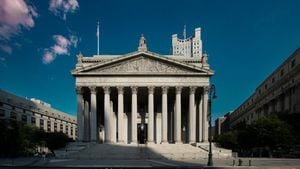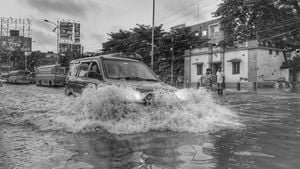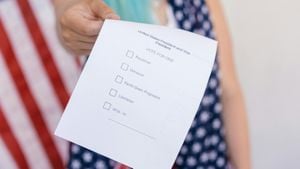Romania is currently embroiled in the suspenseful aftermath of its 2024 presidential elections, with results still being finalized and the potential for significant political shifts on the horizon. The first round of voting took place on November 24, and there have been notable surprises as ultranationalist candidate Călin Georgescu leads the race. With more than 90% of the precincts reporting, Georgescu, running as an independent, has garnered approximately 22.2% of the vote. Just behind him is the center-left Prime Minister Marcel Ciolacu of the Social Democratic Party, who trails with about 20.2%. Meanwhile, reformist candidate Elena Lasconi follows closely at 18%. Adding another layer to this complex electoral scene, George Simion, leader of the far-right Alliance for the Unity of Romanians (AUR), has obtained around 14.1% of the vote.
This unexpected outcome is stirring discussions about the future of Romanian politics. Analysts are closely monitoring votes from major urban areas and the Romanian diaspora, where Ciolacu and Lasconi are expected to perform strongly. The final results hinge largely on these ballots, particularly from Bucharest, where voter turnout has historically been significant.
Georgescu's rise is particularly noteworthy for several reasons. He is known for his nationalistic views and has been characterized by his supporters as advocating for reducing Romania’s reliance on imports and increasing local food and energy production. His platform resonates with many Romanians who feel the strains of economic uncertainty.
Contrastingly, Ciolacu has branded himself as pro-European and has campaigned on issues of deepening European integration and standing firm against perceived threats from Russia. This positioning is particularly pertinent considering the backdrop of the war in Ukraine, which has reverberated throughout the region and influenced many voters’ choices. Notably, Lasconi has taken a staunch stance against any territorial concessions to Russia, emphasizing the need for support for Ukraine.
While initial expectations leaned toward Ciolacu's advancement to the runoff, Georgescu’s performance has complicated these predictions. His supporters see his results as not merely electoral success but as validation of his nationalist philosophy. Immediately following the polls, Georgescu remarked, “The 35-years-long economic uncertainty imposed on the Romanian people became uncertainty for the political parties today. It’s an amazing awakening of the Romanian people.” This sentiment mirrors the frustrations many voters feel, reflecting their disillusionment with traditional political figures.
On the other hand, Ciolacu, who has experienced both support and skepticism from the electorate, has positioned himself as the more stable choice for voters wary of the rightward shift exemplified by Georgescu's rise.
Elena Lasconi, with her advocacy for issues pertinent to younger constituents and her vocal support for NATO’s presence, has also mobilized considerable support. Her campaign has focused on youth opportunities and has appealed to voters who desire progressive changes without resorting to extremism.
The electoral process does not end here; if no candidate secures over 50% of the vote, as is currently projected, Romania will witness its presidential runoff on December 8. The outcome of the first round has already hinted at deepening divisions within Romanian society, as issues surrounding national identity, foreign relations, and economic stability come to the forefront of political discourse.
Voting turnout has also garnered attention, with early reports indicating roughly 52% participation. This level of engagement reflects both enthusiasm and concern among Romanian voters, as they navigate the complex choices before them.
Adding to this atmosphere of contention is the relationship between Romania and international alliances such as NATO and the EU. Georgescu has been openly skeptical of Romania’s NATO membership and often cites perceived inadequacies. His remarks suggest he believes NATO and EU frameworks do not fully cater to Romanian interests, echoing sentiments from other Eastern European nations grappling with similar dilemmas.
For his part, Ciolacu has set his eyes on reinforcing Romania’s partnership with the West, emphasizing the benefits of EU membership and the need for a collective response to security threats from the East. He has been vocal about supporting Ukraine and ensuring Romania plays its part responsibly on the geopolitical stage.
Simion's campaign strategy appears to be building on the wave of nationalist sentiment, and he refrains from alienation from NATO entirely, instead calling for greater adaptability within the alliance's framework for the Romanian situation.
Georgescu has faced scrutiny for his past comments viewed as being too sympathetic toward Russia, and this aspect of his campaign may impact his appeal, particularly among voters aware of the geopolitical shifts surrounding Eastern Europe.
The results of Romania's elections signify more than just the preferences of individual candidates; they reveal broader trends intrinsic to Romanian society, including the palpable anxiety surrounding economic conditions, foreign influences, and the quest for national identity.
With significant ballots still uncounted from key districts, the tension is palpable as Romanians await to see who will claim the presidency, as the runoff promises to be equally contentious. Observers and voters alike remain anxious as the country stands at what feels like a political crossroads.
This round of elections encapsulates not only the dynamics within Romania but also affirms the country's role within European politics, drawing lines between liberal democratic ideals and nationalist sentiments. The final outcomes will shape Romania's path forward as the electorate grapples with pressing questions about governance, sovereignty, and the direction of their nation on the world stage.



